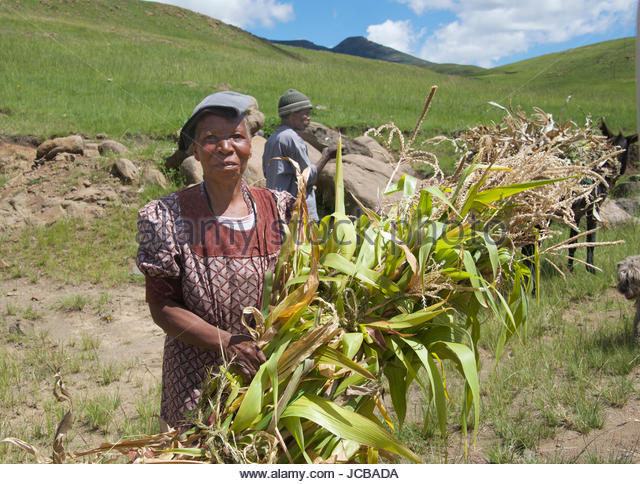
But the women are taking an uncharted path to change the situation.
The women—all members of a small-scale farmers group that seeks to highlight the debilitating effects of climate change on poor rural communities, say there is need for a complete change in efforts to halt the phenomenon.
The farmers’ group is unhappy that rural women’s plight is given little priority on the climate change agenda, arguing that emphasis should be directed at community-based approaches to address gender and climate change.
One of the women, Mapheko Phera, sayst her area was one of the worst affected by El Nino which caused the driest weather phenomenon that hit many parts of Southern Africa in 2015. This was when she decided to join hands with other women to form the Small-Scale Farmers Forum of Lesotho.
Phera, a mother of three, said life began to change for her when she joined the piggery project, a major component of the forum.
She now sells piglets, pork and livestock foods to supplement her meagre earnings from subsistence farming.
“It was in this rural women assembly where I acquired knowledge and skills on farming,” she said.
However, persistent drought meant that Phera’s livestock business was also in danger of collapsing as water had become scarce. This led to her abandoning the piggery project.
“There was no water and food for the pigs and I began losing some of them. I couldn’t stand watching them die without rescuing them. Selling them was the only option left for me,” Phera said while bemoaning the worst drought in living memory that has now crippled her livelihood.
The UN Women supports the essential idea of ensuring that women like Phera are empowered as critical actors in addressing the impact of climate change.
The agency says this is critical in ensuring that women and girls enjoy their rights and are able to make better decisions to better respond to disasters.
The UN Women clearly states that in many parts of the Southern Africa, women and girls from rural areas in particular, are disproportionally affected by the negative impact of climate change.
One of the founders of the Forum, ‘Mamalefetsane Phakoe, said some of the skills members of the assembly acquire include sewing, crop production, animal and poultry farming.
“Our assembly molds women into small scale farmers with the ability of establishing income generating projects with the purpose of adapting to climate change,” Phakoe said.
“We promote the use of indigenous seeds in our cropping activities knowing fully that known climatic patterns have changed. We share amongst others, while on the other hand we also encourage women to practice agrology agriculture and other efforts of being adaptive to this global concern,” explained Phakoe.
The Paris Agreement calls for action to respect, promote and consider respective obligations on gender equality and the empowerment of women in addressing climate change. It also gives mandates for gender-responsive adaptation and capacity building activities.
On the other hand in light of the 2030 Agenda for Sustainable Development Goals (SDGs) adopted by world leaders in 2015, there has to be an opportunity for renewed work on gender and climate.
The UN Women believes that to advance this agenda and contribution to the achievement of SDGs, it is critical to focus on gender sensitive climate change responses and approaches.
The SDGSs agenda adopted by the world leaders in 2015 acknowledges women as beneficiaries and enablers of climate action and as agents of climate change while African Union Agenda 2063 provides a strong impetus for advancing gender and climate change.
The rural assembly women, believe that with the full support from the Lesotho government especially in providing markets for their products, the programme will not just benefit them and their families but also other women from their village who are keen on joining the assembly.
Assembly members produce handicrafts such as shoes, headbands, dried vegetables among others to sustain their families during drought seasons.
In May 2016, a declaration was taken up by rural women, women smallholder farmer organizations, supporting civil societies and media in Southern Africa, in Johannesburg South Africa.
Concerns raised in it included an increasing impact of climate change on rural women smallholders, which they said needs urgent attention to prevent further hardships in their lives and that of their households as well as communities.
It also raised concern over declining access to natural resources such as marine, forestry, land, water and livelihood support systems by rural women smallholder farmers due to the negative impact of climate change.
This Declaration urged the Southern African Development Community (SADC) chairperson to champion the issue of climate change among fellow heads of states and governments.
The Declaration encourages decision makers to prevent a recurrence of the disaster of 2015/16 growing season, by listening to the voices of women in SADC, who demanded the implementation of existing commitments and policies of international and regional conventions that are pro-rural smallholders and gender equality.
Lesotho is said to have small carbon footprint, as it is committed to tackling both the causes and consequences of climate change.
The women, therefore, urges everyone to join hands in building a climate resilient nation.











